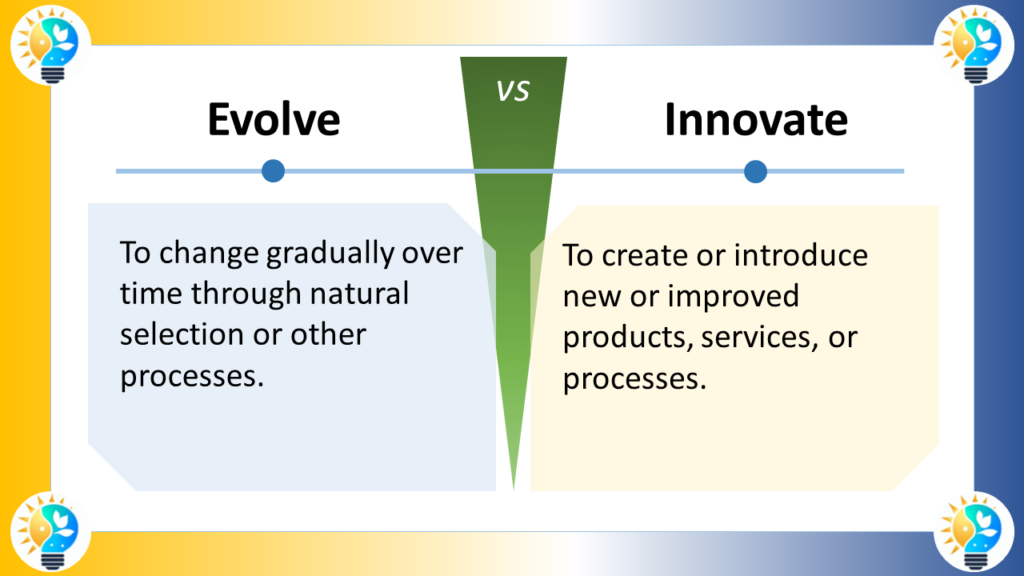Innovation and experimentation are both essential to the advancement of science, technology, business, and many other fields.
They play distinctly different roles in the process of discovery and implementation.

Definition
Innovate
Innovation involves introducing new ideas, products, or methods, or making significant improvements to existing ones. It emphasizes the creation or transformation that leads to novel solutions or dramatic enhancements.
- Novelty: Focuses on creating something new or significantly improving something that already exists.
- Impact: Aims to have a substantial effect on the market, technology, or society.
- Implementation: Involves putting new ideas into practice, often leading to new products or services.
Experiment
Experimentation is the process of conducting trials to test hypotheses or explore the effects of actions in controlled conditions. It is fundamental in research and development for validating ideas and methods.
- Testing: Involves setting up conditions under which scientific or business hypotheses can be tested.
- Discovery: Aims to uncover data, effects, or behaviors that are not yet fully understood.
- Validation: Provides evidence needed to support or refute potential innovations or existing theories.
More Synonyms on innovation, innovate and innovative:
- Adapt
- Advance
- Change
- Create
- Cultivate
- Devise
- Develop
- Discover
- Disrupt
- Evolve
- Experiment
- Fashion
- Generate
- Imagine
- Initiate
- Introduce
- Invent
- Modernize
- Originate
- Pioneer
- Progress
- Prototype
- Radicalize
- Reform
- Reinvent
- Renew
- Revolutionize
- Restructure
- Set Trends
- Transform
- Upgrade

Innovation is considered as a driving force in progress.
It includes the introduction of novel ideas, methods, or products that bring positive change and advancement.
For more information about innovations, check our glossary
Relationship and Relevance
While innovation often results in the application of new ideas, experimentation is typically a step in the process that leads to innovation. Experimentation can validate or challenge the assumptions underlying an innovation, and successful experiments may lead to innovative applications. Conversely, innovative ideas can also give rise to new experiments, testing boundaries and possibilities.
Based on the search results provided, the key differences between innovation and experimentation are:
- Purpose:
- Innovation is about creating something new and different that provides value, often leading to a commercially viable product or service.[1][2][3]
- Experimentation is the process of testing and trying out new ideas or methods to gain knowledge, without a guaranteed outcome.[1][2][4]
- Certainty vs. Uncertainty:
- Innovation embraces uncertainty and is driven by a vision, with the goal of transforming the status quo.[1][2][4]
- Experimentation is more focused on learning through a structured process of testing hypotheses, with less certainty about the final outcome.[1][2][4]
- Execution vs. Exploration:
- Innovation is about the practical execution of turning ideas into marketable offerings.[1][2][3]
- Experimentation is more about the exploratory phase of discovering new possibilities through prototyping and pilot projects.[2][4]
- Commercialization:
- Innovation is ultimately about creating commercially viable and valuable new products or services.[1][2][3]
- Experimentation may or may not lead to immediate commercial applications, as the focus is on learning and discovery.[1][2][4]
In summary, the key distinction is that innovation is about creating and delivering something new that provides value, while experimentation is more about the process of testing and exploring new ideas without a guaranteed outcome. Innovation is more focused on execution and commercialization, while experimentation is about learning and discovery.[1][2][3][4]
Context for Using Each Term
- Innovate is used when referring to the creation of new products or the significant improvement of processes.
- Experiment is used when discussing the method of testing hypotheses or new ideas in a controlled setup.
Example of Utilization
A pharmaceutical company might experiment with different chemical compounds to understand their effects on disease pathways. Based on the results of these experiments, the company may innovate by developing a new drug that targets a previously untreatable condition in a novel way.
FAQ
Q: Is experimentation always part of innovation?
A: Often, yes. Experimentation is a critical part of the innovation process, particularly in fields like science and engineering, where new ideas must be rigorously tested before they can be implemented.
Q: Can you have innovation without experimentation?
A: Yes, some forms of innovation, particularly those related to conceptual or design changes, may not require formal experimentation. However, most physical and technological innovations will involve some form of testing or experimentation.
Q: How do experiments influence innovation?
A: Experiments provide the data and insights needed to refine and adjust innovative ideas. They help innovators understand whether their ideas are viable and how they can be improved or need to be altered to work effectively in real-world applications.
[1] Innovations4 – Difference Between Experimentation and Innovation
[2] LinkedIn – Close Link Between Experimentation and Innovation
[3] UK CPI – The Difference Between Invention and Innovation
[4] Shortform – Experimentation and Innovation

